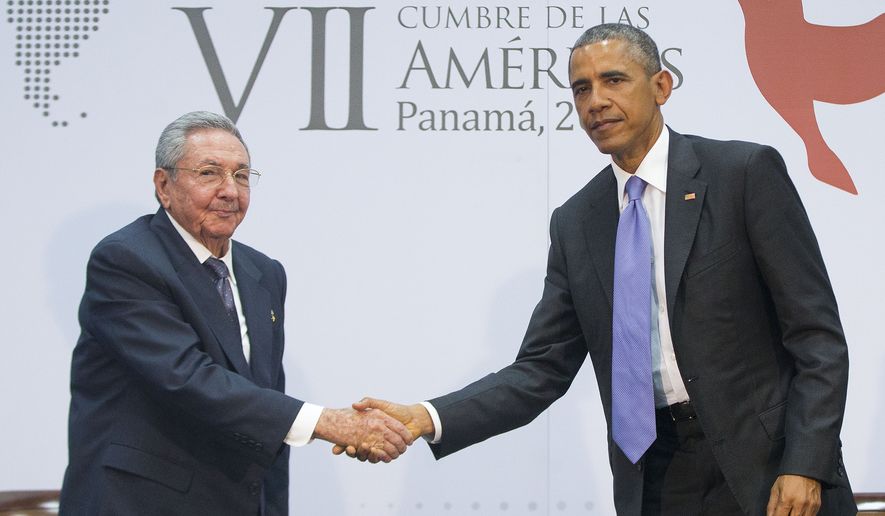OPINION:
After 50 years an American flag will again fly over the American Embassy in Havana. The Cubans, no doubt eager to sample the sweet life in the West, will open their diplomatic representation in Washington.
President Obama tries to justify the renewal with the refrain that “it’s time to change a policy that has not worked.” Like so many things this president says, it’s not true. Over five decades, sometimes with direct intervention (as with the Contras in Nicaragua), The United States succeeded in preventing the spread of ruinous communism in Latin America. It wasn’t for lack of trying by Fidel Castro and his Soviet enablers. The list of Cuban attempts to subvert other governments in the Hemisphere, sometimes with actual military infiltration, is a long one.
President Obama does not learn from his mistakes. There are already demands that the United States lift the Cuban “embargo,” a misnomer for the refusal of the Castro government in the 1960s to compensate American investors for the seizure of their properties. Cuban propagandists, with the help of supporters on the American left and the ribbon clerks in the American business lobby, argue that it was the American blocking of economic relations with Havana that brought on the Cuban disaster. These voices tout all kinds of mutual economic opportunities for American business if the United States takes the next big leap forward and authorizes investment and trade — including economic aid.
But the Obama administration got nothing in return for resuming diplomatic relations. What it did do, however, was give help to a dying regime. Cuba has relations with 190 other countries. Some of them, in Europe and in Canada, have tried to invest and trade and have achieved almost nothing.
It’s difficult to exaggerate the dismal Cuban situation as it returns from immersion in the Marxist fairy tale to the real world. Much of its educated elite has long since departed, and there’s no reason to expect them to give up a good life, with their children long established as American Indians, to “go home.” They are home already.
Cuba’s special quotas for sugar are gone, too. Not only will its sugar industry have to rebuild from scratch, or close to it, but Cuban cane sugar must compete now in a changed world. Subsidized beet sugar, corn syrup and all the other sweeteners developed while Havana slept, have replaced cane.
The United States must, of course, do what it can to help the impoverished Cubans sitting on the American doorstep. Humanitarian generosity aside, it’s in the crucial interests of the United States to contribute to a prosperous and stable Cuba. When the Castro regime finally collapses — as it surely will — a freed but impoverished nation of more than 11 million will start swimming toward Miami, and not all of them metaphorically.
There’s considerable hot air about the prospects for American business in Raul Castro’s Cuba, some of it coming from President Obama himself. Some of it comes from American businesses which profit from export subsidies. Lifting the sanctions before Raul Castro makes the concessions necessary for economic and political progress on the island, is for suckers.




Please read our comment policy before commenting.